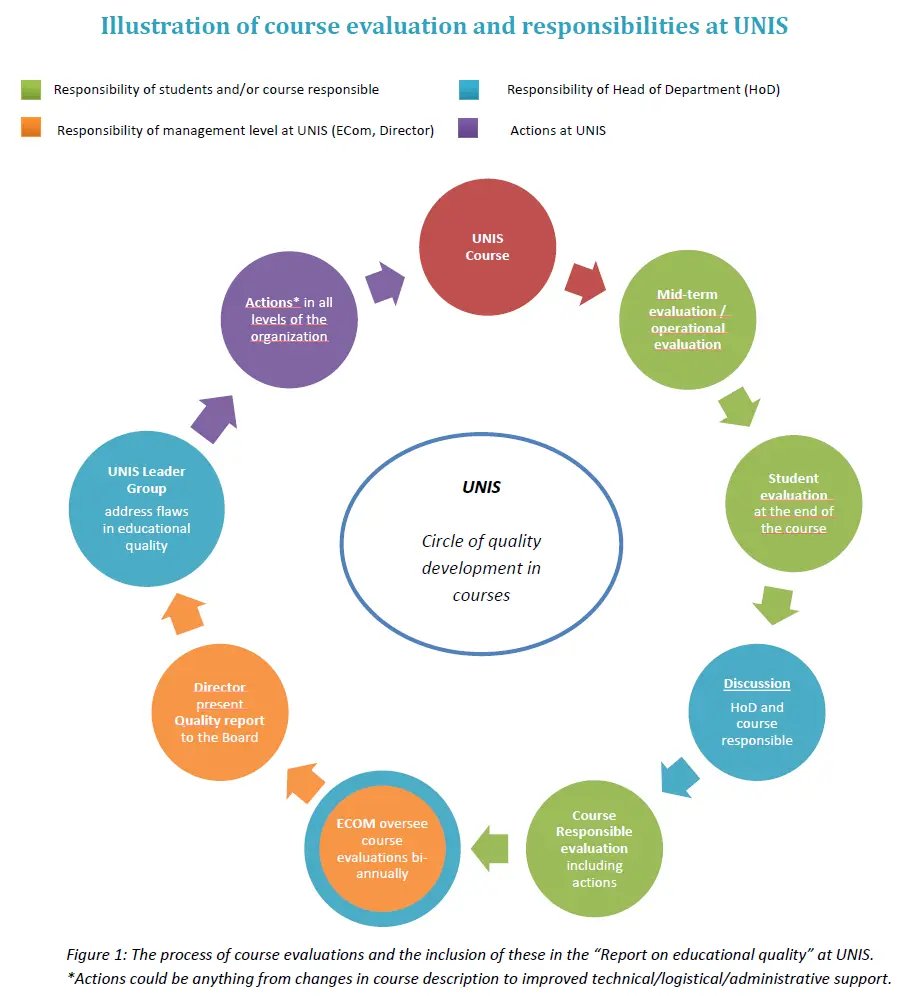Quality Assurance System for Education at UNIS
The quality assurance system for educational activities at UNIS shall secure high quality and continuous focus on improvements in all educational activities at UNIS. UNIS shall offer research- and field-based courses of high quality where students are actively involved, where the learning environment is at high standards and where there is a close follow-up of students.
The quality system is built upon the basis of the quality systems at the Norwegian universities and is anchored at these institutions through hearings during revisions of the system. This ensures that UNIS has a quality system recognizable for, and accepted by our cooperating Norwegian universities.
Tasks and responsibilities
For students
The students have a responsibility to take an active role in efforts involving quality development and quality assurance of courses and the educational setting, i.e.:
- Keep themselves updated about practical and administrative conditions.
- Participate actively in learning and teaching activities.
- Participate constructively in student evaluations of UNIS courses, education and the learning environment.
- Follow UNIS routines and regulations on academic matters and HSE.
- Elect a Student Council and student representatives to Boards and committees at UNIS.
- The Student Council represents and forwards the students’ opinion and acts as a facilitator for students opinions towards UNIS and other relevant institutions.
- The Student Council should initiate and engage in matters relating to quality of education or the educational setting at UNIS.
For teaching staff
Teaching staff are responsible for implementing teaching and learning activities that help students to achieve the learning outcomes of the course. Their responsibility is:
- Ensure that courses have a correct course description, an updated learning outcome and assessment forms relevant for the learning outcome.
- Ensure that courses have a reading list and that all course information is provided in due time to students and all relevant departments at UNIS.
- Have an ongoing dialogue with students about quality of courses and/or supervision, and discuss any academic, pedagogical or practical aspects that could improve the quality.
- Accomplish various forms of student evaluation of the course.
- Quality developments in teaching – evaluate educational quality and implement actions/changes (e.g. pedagogical, content, techniques).
- Guest lecturers: Coordinate teaching material and lecture content, and communicate student feedback.
- Collaborate with colleagues, other departments and institutions on development of new courses and quality assurance/development in existing courses.
- HSE responsibility in planning and execution of course activities.
Course evaluation and revision
UNIS has a regular, systematic monitoring of all courses through written course evaluations. The purpose of the monitoring is to assess the need for adjustments in the courses and in educational activities. UNIS course descriptions are revised once a year.
The effort to improve UNIS courses are a continuous process. Courses are evaluated every time they are arranged. Student feedback is given through course evaluations, but also continually in the day-to-day contact between the students and UNIS staff or through the Student Council. The different types of course evaluations give students an active role in the work on quality of education at UNIS:
Operational evaluation
All UNIS courses perform operational evaluation. This also applied to short/intensive courses (2–6 weeks). Operational evaluation can take form of oral feedback in the classrooms, box for sticky notes by the door or similar activities. The purpose of this evaluation is to receive input on the course, teaching activities/processes, learning environment, in time to assess need for adjustments as the course goes along. No report is required from operational evaluations.
Mid-term evaluation
Full semester courses have a mid-term evaluation initiated by the Education Committee (ECom). The course responsible can arrange the mid-term evaluation in any form preferred by the course responsible, including delegate the task to the student representatives of the course. The evaluation should be conducted approx. 1.5 months after start-up. The results should be discussed by student representative(s), the course responsible and the Head of Department. Findings and actions are to be implemented immediately, and the outcome of the dialogue should be communicated to the students in the course. No report is required from mid-term evaluations, but Head of Departments should report on relevant findings in ECom.
Written course evaluation
All UNIS courses should include a written, anonymous student evaluation at the end of the course. The overall results per course are presented in a report which is sent to the course responsible and the related Head of Department. The Head of Department and the course responsible discuss measures/flaws and actions to be taken and the course responsible submits a short, written course responsible evaluation to UNIS. This evaluation lists feedback to other parts of UNIS and actions/changes to be taken in coming year. All course evaluations from students and course responsible are archived in the UNIS archive system (Public 360). The Head of each scientific department uses ECom as the forum to discuss special cases raised by students or staff, or general findings that need improvement. A compiled report of all course evaluations is made by the Department of Academic Affairs each term and presented in ECom. The overall reports are the foundation for the yearly institutional quality report. UNIS aims for students to receive information about results and plans for follow-ups of evaluations in which they have participated.

Education Committee (ECom)
You can find the ECom mandate here.
Links and resources
- Guideline on calculating students workload
- Student workload calculation sheet 2019
- Guideline on writing learning outcomes
- Form: Proposal of new courses 2024 – 2025
- Process and timeline 2024 – 2025
- Strategy for research and higher education in Svalbard
- How to film your lecture using OBS studio
Strategy documents, quality reports, regulations and student statistics can be found on the following pages: